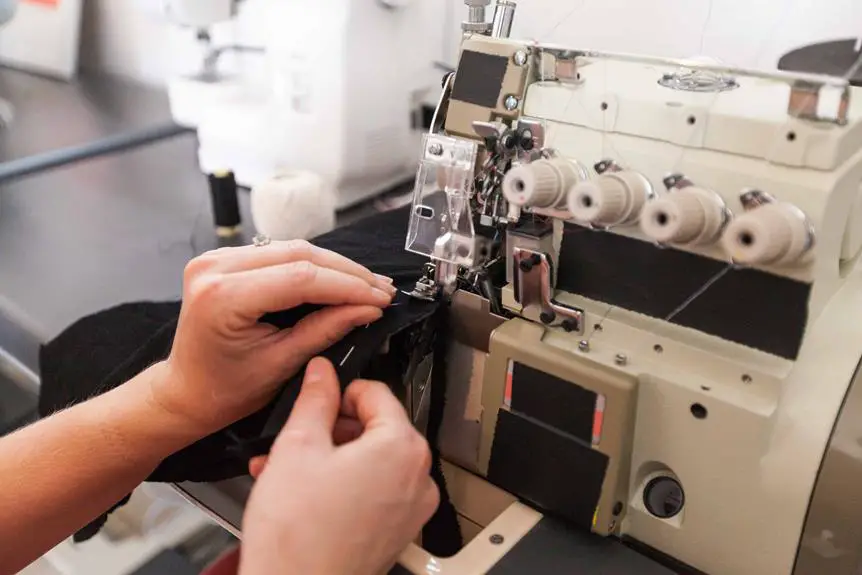When it comes to hand sewing, choosing the right thread for different fabrics can make a significant difference in the quality and durability of your project. You may not be aware that specific types of thread are better suited for different fabric types.
Understanding which hand sewing threads work best for various fabrics is essential for achieving professional results. This guide will provide you with clear and concise information on which threads, such as cotton, polyester, silk, linen, denim, wool, embroidery, and elastic, are best suited for different fabric types, allowing you to master the art of hand sewing with confidence and precision.
Key Takeaways
- Thin cotton thread (60 or 80 weight) is recommended for smoother and delicate hand sewing on lightweight fabrics.
- High-quality polyester thread is ideal for sewing synthetic fabrics due to its durability and flexibility.
- Silk thread is suitable for delicate fabrics due to its fine and smooth texture.
- Linen thread is durable and compatible with natural fabrics like linen.
Cotton Thread for Lightweight Fabrics
For lightweight fabrics, use a thin cotton thread for smoother and more delicate hand sewing. The strength of cotton thread makes it ideal for securing lightweight fabrics without causing damage.
When choosing a cotton thread for lightweight fabrics, consider the thread weight options available. A lightweight fabric requires a finer thread to avoid bulky seams and to maintain the delicate drape of the fabric. Opt for a lightweight cotton thread, such as 60 or 80 weight, to ensure that the thread complements the fabric without overwhelming it. These finer weights are designed specifically for delicate fabrics and intricate hand sewing.
The strength of the cotton thread ensures that it can withstand the tension and stress of hand sewing without breaking or causing damage to the fabric. By selecting the appropriate cotton thread weight, you can achieve seamless and durable hand-sewn finishes on lightweight fabrics, enhancing the overall quality and appearance of your sewing projects.
Polyester Thread for Synthetic Fabrics
When sewing synthetic fabrics, consider using a high-quality polyester thread to ensure durability and flexibility in your hand-stitched creations. Additionally, you'll find that polyester thread offers excellent resistance to abrasion and chemicals, making it a reliable choice for synthetic fabric projects.
Here are some important factors to consider when using polyester thread for synthetic fabrics:
- Thread Tension for Polyester: Adjust the tension on your sewing machine to accommodate polyester thread. Polyester thread is less stretchy than cotton, so you may need to decrease the tension slightly to prevent breakage or puckering.
- Needle Size for Synthetic Fabrics: Use a needle specifically designed for synthetic fabrics. A needle with a fine point and a slightly rounded tip will help prevent snags and runs in the fabric, ensuring smooth and even stitches.
- Stitch Length: When sewing synthetic fabrics with polyester thread, opt for a slightly longer stitch length. This helps prevent the fabric from puckering and provides a more secure seam.
- Backstitching: Consider using a shorter backstitch when securing seams with polyester thread. This helps maintain the fabric's flexibility and prevents any stiffness in the finished garment.
Silk Thread for Delicate Fabrics
When working with delicate fabrics such as silk, it's crucial to choose the right thread for your hand sewing projects.
Silk thread is an excellent choice for delicate fabrics due to its fine and smooth texture, which minimizes the risk of causing damage to the fabric.
Additionally, silk thread provides a seamless and elegant finish, making it ideal for intricate and detailed sewing on delicate materials.
Silk for Delicate Fabrics
When sewing delicate fabrics, choose silk thread for its strength and fine texture. Silk thread is an ideal choice for delicate fabrics due to its properties, such as:
- Strength: Silk thread is strong and durable, making it suitable for securing delicate fabrics without causing damage.
- Fine Texture: The fine texture of silk thread allows for seamless stitching on delicate fabrics, preventing any damage or pulling of the threads.
- Smooth Finish: Silk thread provides a smooth finish, ensuring that the delicate fabric retains its elegance and drape.
- Minimized Abrasion: Silk thread minimizes abrasion on delicate fabrics, preserving the integrity of the material over time.
When working with delicate fabrics, consider using silk thread to achieve professional and long-lasting results. While there are alternatives available, silk thread stands out for its ability to complement delicate fabrics while offering durability and a refined finish.
Thread Choice for Silk
Selecting silk thread for sewing delicate fabrics ensures strong and seamless stitching, preserving the fabric's integrity and elegance. When working with silk, it's crucial to adjust the thread tension to prevent puckering or damaging the delicate fibers.
Set your sewing machine to a lower tension level and consider using a finer silk thread to achieve the best results. Additionally, needle size is of utmost importance when sewing silk. Opt for a smaller needle size, such as 60/8 or 70/10, to prevent visible puncture marks on the fabric.
The finer needle will also help maintain the fabric's delicate nature and prevent any snags or pulls. By paying attention to thread tension and needle size, you can ensure that your silk sewing projects are executed with precision and finesse.
Linen Thread for Natural Fabrics
For sewing natural fabrics like linen, choose linen thread for its durability and compatibility with the fabric's characteristics. Linen thread is an excellent choice due to its strength and ability to withstand the natural movement and tension of linen fabric.
When using linen thread for natural fabrics, consider the following:
- Strength: Linen thread is known for its exceptional strength, making it ideal for sewing natural fabrics such as linen. Its durability ensures that the seams and stitches hold up well, even when the fabric is subjected to regular use and laundering.
- Color Options: Linen thread comes in various color options, allowing you to select the most suitable shade to complement the natural tones of the fabric. Matching the thread color with the fabric enhances the overall aesthetic appeal of the sewing project.
- Compatibility: Linen thread is specifically designed to complement the characteristics of natural fabrics. Its compatibility with linen ensures that the thread and fabric work seamlessly together, resulting in strong, long-lasting stitches.
- Natural Look: Linen thread blends seamlessly with natural fabrics, creating a cohesive and authentic appearance. This natural look enhances the overall appeal of the sewing project, particularly when working with fabrics like linen that exude a distinct organic charm.
Denim Thread for Heavy-Duty Fabrics
When choosing a denim thread for heavy-duty fabrics, durability is a key factor to consider. The thread should be able to withstand the wear and tear that comes with working with heavy fabrics like denim.
Additionally, having a variety of thread color options can help you achieve a seamless and professional finish on your denim projects.
Denim Thread Durability
Consider using a thicker and more durable denim thread when sewing heavy-duty fabrics such as denim. The strength and durability of the thread are crucial for ensuring the longevity and resilience of the stitched seams in heavy-duty fabrics.
Here are four key factors to consider when selecting denim thread for heavy-duty fabrics:
- Thread Weight: Opt for a heavier thread weight, such as 40wt or 30wt, to ensure it can withstand the stress and strain exerted on heavy fabrics.
- Material Composition: Look for denim threads made from strong materials like cotton-wrapped polyester or heavy-duty polyester to enhance durability.
- Colorfastness: Choose a thread that's colorfast and resistant to fading, especially important for denim garments that undergo frequent washing.
- Twist: Consider a tightly twisted denim thread to provide enhanced strength and prevent fraying in heavy-duty fabrics.
Selecting a durable denim thread will contribute to the overall quality and longevity of your heavy-duty sewing projects.
Thread Color Options
Choose the appropriate shade of denim thread that complements the fabric and enhances the overall aesthetic appeal of your heavy-duty sewing projects.
Thread color selection plays a crucial role in the visual impact of your finished piece. When working with heavy-duty fabrics like denim, consider the thread color psychology and the effect you want to achieve.
A contrasting thread color can add a modern twist to traditional denim garments, while a matching thread color provides a classic look. Remember that the thread color should blend seamlessly with the fabric and not overpower the overall design.
For heavy-duty fabrics, such as denim, opt for darker shades of thread like indigo or charcoal for a sophisticated finish. Understanding thread color psychology and making deliberate choices will elevate the visual impact of your heavy-duty sewing projects.
Wool Thread for Textured Fabrics
You'll want to use the wool thread for textured fabrics to ensure durable and flexible hand-sewn seams. Wool thread is an ideal choice for sewing textured fabrics due to its ability to provide strong and resilient stitching that can withstand the unique challenges posed by these materials.
Here are some essential tips for using wool thread on textured fabrics:
- Needle Size: Opt for a larger needle size, such as a size 90/14, to accommodate the thickness of the wool thread and the textured nature of the fabric. This will prevent the thread from getting stuck or creating too much tension on the fabric.
- Tension Control: Adjust the tension on your sewing machine or maintain even tension when hand sewing to prevent the wool thread from breaking or causing puckering on the textured fabric.
- Stitch Length: Use slightly longer stitch lengths when sewing with wool thread on textured fabrics to prevent the thread from sinking into the fabric and getting lost within the texture.
- Thread Conditioning: Consider conditioning the wool thread with beeswax to enhance its strength and smoothness, making it easier to sew through the unique textures of the fabric.
Embroidery Thread for Decorative Fabrics
To achieve intricate decorative stitching on delicate fabrics, embroidery thread offers enhanced flexibility and vibrant color options. When working with decorative fabrics such as silk or satin, it's crucial to select the right thread weight for embroidery to ensure your stitches lay beautifully on the fabric. Generally, a 30- or 40-weight thread is ideal for decorative stitching, as it is not too heavy to weigh down delicate fabrics, yet it still provides enough coverage for bold and vibrant embroidery designs.
When it comes to decorative stitching, thread tension plays a critical role in the outcome of your embroidery. Proper tension ensures that the stitches lay evenly on the fabric, creating a professional and polished look. However, too much tension can cause the fabric to pucker, while too little tension can result in loose and messy stitches. It's essential to adjust the tension on your sewing machine or hand embroidery hoop to achieve the perfect balance for your decorative fabric.
| Thread Weight | Fabric Compatibility |
|---|---|
| 30-weight | Silk, Satin |
| 40-weight | Organza, Tulle |
| 50-weight | Chiffon, Lace |
| 60-weight | Taffeta, Velvet |
Elastic Thread for Stretchy Fabrics
For sewing stretchy fabrics, elastic thread provides the best results due to its ability to stretch and recover with the fabric's movement. When working with elastic thread for stretchy fabrics, keep these tips in mind:
- Proper Tension: Adjust the tension on your sewing machine to accommodate the elasticity of the thread. This will ensure that the thread stretches along with the fabric, preventing breakage and puckering.
- Stretch Stitch: Utilize a stretch stitch or a narrow zigzag stitch when sewing with elastic thread. This allows the fabric to stretch without causing the thread to break.
- Use the Right Needle: Opt for a ballpoint or stretch needle when sewing with elastic thread. These needles are designed to penetrate stretchy fabrics without causing damage or skipped stitches.
- Practice Elastic Thread Techniques: Experiment with different techniques such as shirring, gathering, or creating smocked effects to take advantage of the unique properties of elastic thread and enhance the elasticity of the fabric.
Frequently Asked Questions
Can I Use Cotton Thread for Heavy-Duty Fabrics Like Denim?
Yes, you can use cotton thread for heavy-duty fabrics like denim. However, for added strength and durability, consider using a polyester or nylon thread. These options will provide better resistance to wear and tear.
Is Silk Thread Suitable for Machine Sewing?
Yes, silk thread is suitable for machine sewing. It's ideal for delicate fabrics, creating fine, elegant seams. However, for durable machine sewing, especially with heavy-duty fabrics like denim, a stronger, more durable thread may be more suitable.
Can Linen Thread Be Used for Embroidery on Delicate Fabrics?
When working with delicate fabrics for embroidery, linen thread alternatives can be suitable. It's important to consider the weight and texture of the linen thread for best results. Take care to use proper hand sewing techniques for delicate fabrics.
What Type of Thread Is Best for Sewing Spandex or Other Stretchy Fabrics?
For sewing spandex or other stretchy fabrics, it's best to use a ballpoint needle and a polyester or nylon thread. The needle type and thread weight are important for stitch tension and elasticity, ensuring smooth, durable seams.
Are There Any Special Considerations for Using Wool Thread on Textured Fabrics?
When sewing textured fabrics with wool thread, consider the delicacy of the fabric. Wool thread can enhance the texture and bring out the best in the fabric, but be mindful of potential snagging on delicate weaves.
- Decoding Nonwoven Fabric: From PP to PET and Beyond - July 11, 2025
- The Essential Guide to Woven vs. Nonwoven Textiles - July 11, 2025
- All Your Questions About Nonwoven Fabric Answered - July 11, 2025






